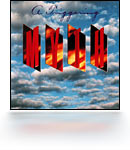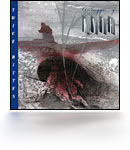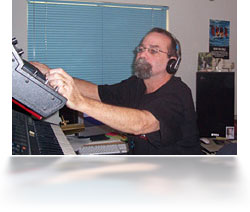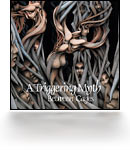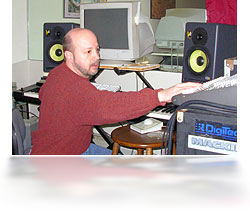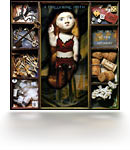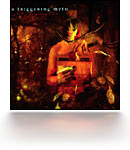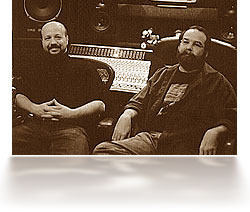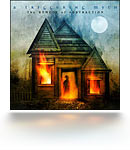|
A Triggering Myth Interview I/E Magazine, Spring 1994 i/e: What are your musical backgrounds? Formal education? Bands? EDDY: I majored in music, studying guitar and piano, for about two years in undergraduate school. I also studied the trumpet for about three or four years in my teens. I played in rock bands from the time I was 15 or so till my mid twenties. For about two years, before coming to Virginia, I played in a great band called "One Bear ... Dancing". It was a trio consisting of myself on keyboards and guitars, a violinist/cellist and a French horn/flute player. We were very influenced by Henry Cow. Some of the music was very composed and some was totally free. It was a wonderful experience and I matured a lot as a musician and composer during that time. DRUMHELLER: I had eight years of private study on the piano and played in various rock bands for several years. Later I developed a b interest in jazz and fusion. Electronic instruments played a big role in my compositional ideas from the late seventies to the present. i/e: What are your influences and how are they important to your own music? DRUMHELLER: I tend to pull from a broad range of music. I think my best influences are the progressive elements of rock, classical and jazz. Although many European artists such as Univers Zero, King Crimson, and many ECM musicians, like Eberhard Weber, have had a great deal of influence on me, my favorite pianist is a fairly obscure American named Art Lande. EDDY: I grew up musically in the golden era of the late 60s and 70s. My earliest influence was the Beatles and they are the reason I became a musician - at least initially. I really loved the whole Progressive movement of the 1970s. Particularly the Italian stuff. Bands like Area, Banco, PFM, Arti e Mestieri and a number of others were just great. In fact, I still listen to that stuff with some regularity. Other influences were Gentle Giant, Hatfield/National Health, Crimson, Henry Cow. All the bands that adventurous listeners of that era listened too. I also enjoy classical music quite a bit. Particularly the early 20th century - Stravinsky, Bartok, Prokoviev and so forth. I also listen to a lot of jazz . Sadly, I find the best jazz music today coming not from the US, but out of Europe and South America. People like Egberto Gismonti. If you haven't heard Egberto Gismonti's Brazilian records, your really missing out. He's something very special. i/e: How did A Triggering Myth come about? Whose idea was it and where did the name come from? EDDY: I moved to Richmond, in 1983 and found it less than musically compatible. Their was no progressive scene here at all and only a little jazz. And most of that was pretty straight ahead. Little or no fusion. By 1985 I was fed up and desperate. I finally broke down and went down to the best record store in town which had a bulletin board for musicians. I put up an add which read something like, "Isn't their anyone else in Richmond who's interested in intelligent, progressive, instrumental music? Several days later I received a phone call from our friend and Tim's roommate at that time, Steve Williams announcing that there was indeed someone else in Richmond interested. In fact his roommate was interested also. Tim and I have been together ever since. The name of "A Triggering Myth" is my idea. I have a b interest in philosophy and psychology and fall very much on the existential and phenomenological side of things. The name of the band is a representation of my personal view of the "Ultimate truth" question. The idea goes that, the foundations we base our lives on, be it God, karma, random chance, whatever, are today's Myths. And even if they are false truths or foundations (and its infinitely probable that they are) they still have an enormous value in that they trigger tomorrow's myths - which trigger tomorrow's myths - which trigger tomorrow's myths - which ......... and so on! That applies to the music of A Triggering Myth as well. Each disc is a snapshot of that period's myth. That point in our development. It will not be as mature as we'll be someday but it will aid in our development toward that maturity. i/e: What do you see as the main differences between the first CD and Twice Bitten, which seems in many ways a giant leap forward both in terms of sound and composition. DRUMHELLER: I think they differ both technologically as well as compositionally. Twice Bitten, is more refined in both categories but some of the ideas on the first one are conceptually as b. We were able to upgrade much of our equipment after the first one which has played a major role in Twice Bitten's improved sound quality. From a compositional standpoint, I think both of us have matured in part by natural progression but mostly through lots of effort. EDDY: Twice Bitten has, I think a harder edge to it. I play more guitar on it as well and we both played more acoustic instruments. I think we have consciously improved in the craft side of making music. We've worked rather hard at it. But most of the development of the creative side, both as individuals and together as a single musical entity, I think, comes as a result of working and playing together. It is seemingly natural and unconscious. i/e: The term 'progressive rock' has been and will be applied to A Triggering Myth. What does that term mean to you? How do you think ATM relates to other groups operating in the progressive theater today? EDDY: I'm uncomfortable comparing our music to anyone else's. Art is not competitive. Each artist is simply making the music they want and it should be judged individually on its own merit for what it is. What you're getting at is the whole "What is progressive rock?" argument. Like anyone else who came out of that musical era, I certainly have my opinion. As I remember, the term progressive was chosen back then because it best represented a philosophical approach to rock music (i.e. This can be more than pop music. This can be art) at a time when rock, as an art form, was in its embryonic beginnings. In the 30s and 40s jazz was the "core" of pop music. It inevitably evolved and "progressed" through its merger with pop music and the pop music industry. By the 1950s, it had pretty much done what it could do without leaving its pop elements behind. At that time, rock music surfaced and took its place as the "core" of pop music. Jazz then went off on its own as an art form, outside the pop idiom and industry, where it continues to "progress" and flourish today. Towards the end of the seventies, rock had evolved beyond the structural limitations innate in rock/pop music. Bands like Henry Cow, Area and even more vocal oriented bands like Yes ( with an album like "Relayer") were simply writing themselves out of the market by writing music, simply put, over the head of the average pop listener. However, unlike jazz, whatever music which was supposed to come after rock in the pop idiom, didn't (and still hasn't). This left young musicians coming up in the late seventies in a bind. As in any generation, they needed some kind of rebellious music of their own. The situation at this time seemingly left only two choices: One, the commercial side which was tightly controlled by the corporate industry ( those who they needed to rebel against the most) or two, the art or progressive side of rock, which few, if any 17 year olds have the chops or perspective to play. Besides, that wasn't their music, it was our generation's music. Of course, neither choice was acceptable to them. There seemed no choice for them at all. Rather than working on trying to develop some new form of music and allowing rock to go off as jazz had and continue its progression, they decided to pretend that rock had never grown up and tried to start it all over again. That's where the punk movement came from. You know, the "Let's learn three chords, listen to MC5 records and start a band". Except for the originality factor, it was just like we did in the early 60s. And remember, this 2nd generation of rock was new to them. They weren't around the first time. However, the sad part is that it was, and is, extremely unoriginal and redundant music - whether they knew it or not. And this has retarded the current development of not only pop music, but also progressive rock music as well. It has allowed, and encouraged musicians whose hearts are in the rock era, to remain in the pop industry and musical culture by providing a forum for them to make a substantial living by playing rock/pop music, however redundant. When jazz left the pop idiom, the only forum for people whose passion was jazz, was to be adventurous and pursue jazz as an art form. That pursuit is not only discouraged for the rock era musician, but we have to actively fight to do so. I guess that's what I see ATM as doing. We're continuing the evolution of the art form of rock, removed from the pop idiom and industry.. At least that is our intent. You notice I didn't mention any of the neo-progressive bands. As I said before, I'm uncomfortable making comments about specific band's music, but I will say this. Music which sounds like 1972 Genesis, or anyone else for that matter, is not progressive in 1993. In the same way that a big band that sounds like Benny Goodman is not progressive jazz today. It may have been at one time, but not anymore. Just look in the dictionary under the word progressive. If anything, Yes and Benny Goodman clones are regressive music. Not necessarily wrong or bad, just not progressive. i/e: Obviously there will be some out there who will be interested in just what nifty little electronic toys you guys used to make all the wonderful sounds on Twice Bitten. Could you give us a brief rundown of your equipment and then, armed with that knowledge, describe your recording process? DRUMHELLER: We use an array of different keyboards and modules from various manufacturers such as EMU, Roland, Korg, Yamaha, Oberheim, and Kawai among others. We use Lexicon, Alesis, DBX, Ashley, Tascam, and Drawmer signal processors. A Tascam 8-track recorder and digital 2-track deck are our current tape formats. A Macintosh computer provides about 90% of control over all the electronic instruments as well as a means to synchronize with acoustic or non-midi tracks on tape. Guitars played were Fender and Jackson electrics and a D-28 Martin acoustic. Both an upright bass and Fender and Ken Smith bass guitars were used as well as drums and percussion. We also used various sundry instruments including trumpet and recorder. EDDY: Our recording process is pretty simple. Sometimes we set up and play direct to tape and then overdub and sometimes we record one track at a time. I think of the process very much in the same way I think a painter does when painting. We lay down basic ideas and then build upon them, adding musical colors and space where they seem to belong. We never know fully what a piece will sound like till its finished. Sometimes a piece will come out sounding quite different than what it sounded like in my head when I wrote it. Tim and I write music somewhat differently. Tim tends to write more at the piano & keyboards and in the course of playing, comes up with ideas. I tend to compose in my head and then try to figure out how to play it and make it sound like it does in my head. DRUMHELLER: I feel the ability to capture the moment, so to speak, is very important. As a result, we improvise a great deal. Sometimes conceptual ideas of a larger piece of music can come from several improv sessions. i/e: "Myths" from the new CD is over 21 minutes long. Is this a trend for ATM in the future? EDDY: We don't really approach our music in a very conscious way. What I mean by that is that we never think "Let's write something like..... We start with the first idea and build from there. We never know, ultimately, what a piece will sound like or how long it will be, until its finished. "Myths" is 21:00 minutes long because it just sort of arrived there during the process of making it. DRUMHELLER: As far as a trend goes, its hard to say one way or the other, I'm sure we will do other long pieces in the future, but as Rick said, we don't set out to do so. i/e: The cover of Twice Bitten is very different from your first album. It evokes a older time and has a much 'darker' feel to it. Was this something you looked for in cover art? What can you tell us about the artist, David Freed? DRUMHELLER: Yes it does have a darker feel to it and I believe it evokes the same types of feelings as much of the music on the disc. I also think Both Rick and I, due to our musical influences, tend to gravitate more to the dark side of art, both visually and musically. EDDY: The difference in the cover art is intentional. For the first one, we felt it was very important to establish our logo which was designed by Jack and Judy Kauffman. Its a pretty elaborate photographic effect and design and it took quite a while to do. Twice Bitten's cover is an etching called "Cain and Abel" by David Freed. Its part of a large work called "The Genesis Series". I find it to be powerful and moving. It also fits in nicely with our name as I'd say Christianity is probably the ultimate western myth. i/e: A lot of listeners are put off by purely instrumental music. What do you think of this attitude among progressive music listeners? Will there be any vocal music in ATM's future? EDDY: I think at some point we'll do a vocal tune. The idea of writing lyrics for a larger piece is something I've given some thought to and is very appealing to me. I don't know why but it just hasn't happened yet. Besides I don't sing all that well and Tim sings even worse. In terms of your second question, I feel people are entitled to whatever opinion they wish. That's the beauty of any art. Its totally individual and subjective. I think ultimately, there are only two kinds of music. Good and Bad. And I think every kind of music has both. And every person makes that determination for themselves, and only themselves. DRUMHELLER: I agree. With the exception of classical music, there are more groups out there both in the progressive field and many others that relay part of their expression and or message through words. Actually some of my favorite groups are vocal oriented. However due to the higher percentage of vocal artists, a number of listeners don't really connect or bond with just music alone. Also as more and more music is presented in video form, the ability for the listener to develop an opinion of the music by itself is diminished. i/e: What about ATM performing live? Are there any concert plans for the future? DRUMHELLER: We have done a few performances with additional musicians playing keyboards, guitars, bass and percussion. Some of our new material will definitely lend itself more for live performance and I'm sure we will be doing some in the future, but we don't have any definite dates as yet. EDDY: As much as I enjoy playing live, the idea of living on the road again, even for a relatively brief time , is roughly akin to going to the dentist for me. But, it would be great to play this music live and see what it would sound like in front of an audience with a larger ensemble. It would certainly change it but I'm not really sure how. I think its safe to say we'll eventually do some live shows but on a limited basis. i/e: What is up and coming for A Triggering Myth? Furthermore, where do you think progressive music is headed in the '90s? DRUMHELLER: Actually, yes, our third release is currently in progress and should be out in early 94. As far as the future goes, we plan to be involved in quite a few projects in the years to come and will continue to evolve and, hopefully, progress. I think as technology improves and the ability to produce quality music without going bankrupt, I believe we will see many creative artists infiltrate and expand the progressive arena. EDDY: I agree. Technology in recent years has allowed independent artists of all types of music, including progressive, to get their work produced and released. In fact, we've added a studio component and have plans for a label releasing other artists of a broadly, similar nature. Time will tell where progressive music is heading. We only hope to be a part of it. |
